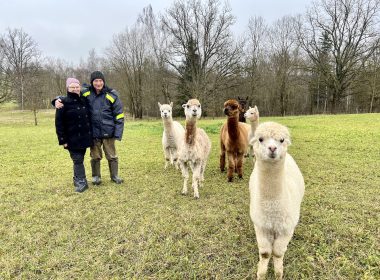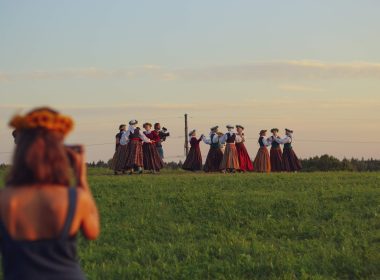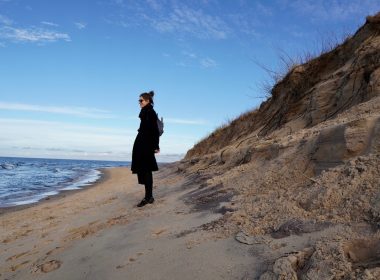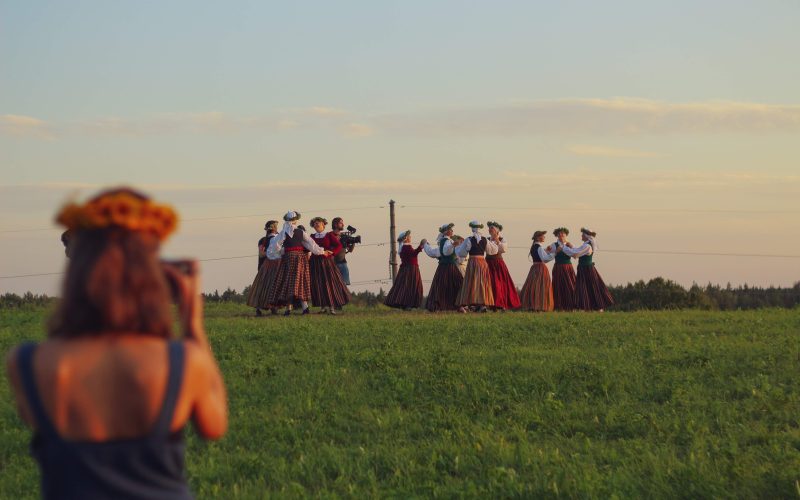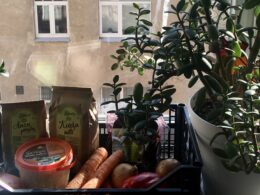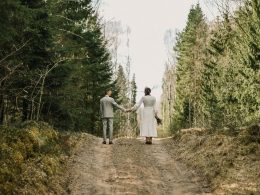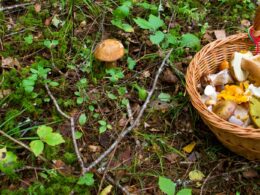In 2017, Englishman Conor Gorman joined a Latvian choir in London. At one fateful practice, he stood next to Diāna Vaznele who, in “true Latvian fashion” had joined the choir “to sing, not make friends”. Fast forward to today and the two are not only close friends, but also working together on the documentary film Latvian Myth, attempting to get to the core of the Latvian dzīvesziņa – collective wisdom, folklore or philosophy – and its relevance in the context of today.
On their journey since starting to film in 2019, they’ve met legendary figures from the Latvian culture and folklore scene, including ex-president Vaira Vīķe-Freiberga!
I caught up with Conor, Diāna and fellow team member Agnese Āboliņa (Diāna’s sister) to get deeper into the idea behind the film and plans for it. We concluded that we have a lot in common, all having invested countless hours in labours of love revolving around identity and sense of belonging, and aspiring to build community.

Tell us how you all came together and what makes you the perfect team to make a film like this?
Diāna: With Conor our friendship grew around being in nature, going hiking, surfing and camping. As you do in nature, we’d reflect on our own lifestyles, being away from London and spending time in these two contrasting environments. We talked a lot about alternative ways of living, considering how we feel in London.
We both had similar feelings about what the city does or at least the way that we experience the city and what it’s done to our mental health, and the opposite – what the choir does and what its benefits are. I’d share what my experience was growing up in Latvia, and the values that I have from that lifestyle – being completely nature-immersed, growing up in a deep forest with 20 people in the village. That was fascinating for Conor!
We discussed it so much that we thought – let’s go to Latvia and chat to people who’ve spent their whole lives researching these ways of living and this knowledge that Latvians carry. Could they help us answer whether this knowledge is valuable in the modern day in a global context and not just for Latvians?
Conor was able to look at it from the side and see that, yes, this is for everyone. At that point, my sister Agnese said “why am I not part of this?” She had the same questions. And Conor met now Latvian Myth co-director Masha in London – a Latvian girl with a very mixed background and upbringing, and many questions around belonging and cultural values. And together, through our values and mixed expertise the four of us created Human Collective [a creative agency and UK based production company of true film].
We joined the choir in 2017 to be part of the Song and Dance Festival. Conor and I were looking at doing something around the choir and community. In 2019, we recreated a Summer Solstice celebration. Covid came, and we didn’t take the project anywhere. We tried to get some funding but it was all put on hold until a trip we took last spring with Conor, my husband and friends surfing in Cornwall.
The conversations came up again. Questions like what are we doing, what’s going on with our lives, where’s the planet going? We thought about community a lot and how everything’s moved online and how we’ve dealt with all of this. From there, we thought – we have this incredible footage we filmed! Let’s go and talk to these people in Latvia who we already know and make it into an in-depth conversation project around these values and traditions.
Very quickly it turned from a short series to involving Kultfilma [a top production company in Latvia and now Latvian Myth co-producers] and we realised it needed to be a full-length thing. No one’s done this before – we have an Englishman who sings in a Latvian choir and is a director, and a diaspora Latvian filming. Co-directors with two completely different perspectives and who can both be in front of the camera as well.
Agnese: I live in Austria and founded an association here about meaningful life, awareness, consciousness, self-development and connecting with nature. Then I heard that these guys were making a film based on everything I’d been researching but through the lens of tradition! Although we’ve been living these Latvian traditions in our family, I’d never delved into them.
All these ancient cultures have philosophies. What is the Latvian philosophy? Why are we looking towards yoga, India and Mexico when we have the Latvian dzīvesziņa? Yet we don’t really understand what it is.
Do you feel that these traditions are somehow endangered?
Diāna: For me, the overall feeling has been that they are very much alive in these small pockets. We’ve now accessed communities that nurture them. But many traditions are completely gone and many are struggling. We spoke to an archaeologist who said “everything that is alive dies eventually and then is reborn” and that’s been my biggest conclusion.
It’s more a question of adapting to the time, and time is moving forward. We can’t go back and live like our ancestors did. That’s just how the planet is. For some though, to go back and live like that is a utopian dream.
But how do we take the message [from our ancestors] and integrate it into our lives, so that it carries that value and teaches us to live in harmony, to respect others, to respect nature and not work against each other and the world around us?
Agnese: Singing old folk songs, for example. “Ai, zaļā birztaliņa, kā es tevi sen taupīju. Ne zariņa nenolauzu, brāļa govis ganīdama” (Oh, green birch grove, how long I’ve been protecting you. Not a branch did I break as I herded my brother’s cows). While I don’t have cows to take care of, when I sing this song out in nature, I realise that if I go into the forest with this notion, I’m not going to touch even the smallest leaf. This is a perception of and an attitude towards the world. We can still use those words and songs to create a respectful relationship with the world.
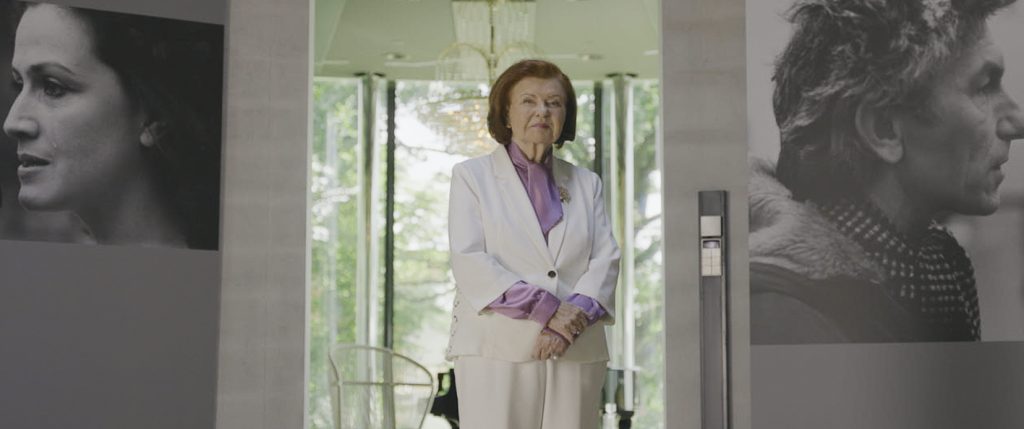
How did you find your way to the amazing humans you’ve interviewed for the film? Has it helped that Latvia is so small and its people so connected?
Conor: Being in the London Latvian choir for almost seven years, getting to know people has been a big part of my journey. It’s great how accessible people in Latvia can be but, for me as a non-Latvian, it’s a case of approaching the culture respectfully first. Getting to know everyone bit by bit and celebrating the culture alongside them.
Also, our collective efforts as a team. Diāna and Agnese [who are sisters] and their family have such amazing interpersonal relationships with so many people already, especially in the folklore scene. It was beautiful to observe and experience those relationships being explored in a deeper way.
Some meetings happened literally by chance. It has sometimes felt like there’s a conveyor belt slightly pulling us along. It’s felt like a very natural flow. We’ve been trusting that process and our gut.
At the 2018 Song and Dance Festival, I stood next to the architect Ivars Mailītis. He was in the queue with us, and we had a good chat. We stayed in touch, and he introduced me to his son Austris. Some people have invited us into their very personal spaces. It’s been beautiful. Every time you meet a new person, they go “you should meet this person”, so the list of who we could interview or meet kept building.
When you approach things with respect, curiosity and time, people open up.
Agnese: I would also add – dream big! We wanted to talk to Vaira Vīķe-Freiberga because she’s the one! The white witch. And she said yes. But choosing these people isn’t easy and there are many more we’d still love to interview.
Diāna: We also have an amazing producer, Dārta Vijgrieze, who helps our big dreams come true. She’d be like “you guys are crazy” when we said we wanted to speak to Vaira, every single lead conductor of the Song and Dance Festival etc. But she’d say “I’ll do it!” and she did.

What’s your dream scenario for the film? Where would you like to see it screened?
Diāna: Right now, the dream is to finish the film and have the finances in place to do so. We’re getting there but there’s still a lot to do. The finances will determine the journey.
The dream is to go to festivals. It might take a while, and they’re not cheap to take part in. One of my biggest dreams would be Sundance, Sheffield Doc Fest and Cannes as well. Those are just a few.
Because we’re doing this independently, there’s no set route. It’s about building relationships and seeing how we go. Learning.
We’re aiming for international reach. The film celebrates Latvia but it’s for a global audience. It’s about exploring the values we’re uncovering in the film, and that’s a deeply personal individual journey.
We definitely want to do screenings in Latvia, London and wherever else is possible.
Conor: Diāna’s story is one that diaspora communities, especially Latvians, will be able to connect to. For me, being a non-Latvian, I bring the outsider’s perspective in a lot of ways, so it’s bringing a new audience to the Latvian way of life but also the values it represents. With the conflicts, mental health issues and problems in the cities we’re seeing today, it’s about trying to explore different ways of building communities and how we can be more supportive of each other.
Part of the bigger dream is building community. It’s how we can change perspectives and inspire people to see differences in others as a place of understanding and opportunity and learning.
Hopefully, it won’t just be a film but… also, we’re planning an exhibition in London and Latvia if we can get the needed funds.
Agnese: Latvian Myth is already such a living, breathing thing. No matter where we go it just uncovers unimaginable paths.
Thank you and all the best for Latvian Myth!
If this story has struck a chord with you and you’d like to support the making of Latvian Myth, you can fund the team’s efforts through Kickstarter until 22 June. Or, if you can help organise a screening or offer an alternative way of collaborating, reach out to them!


